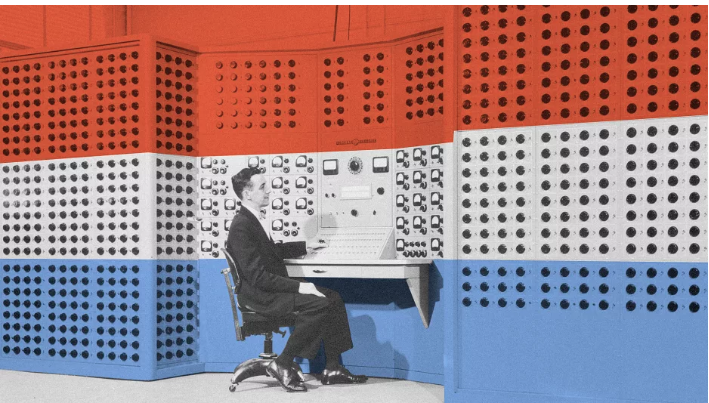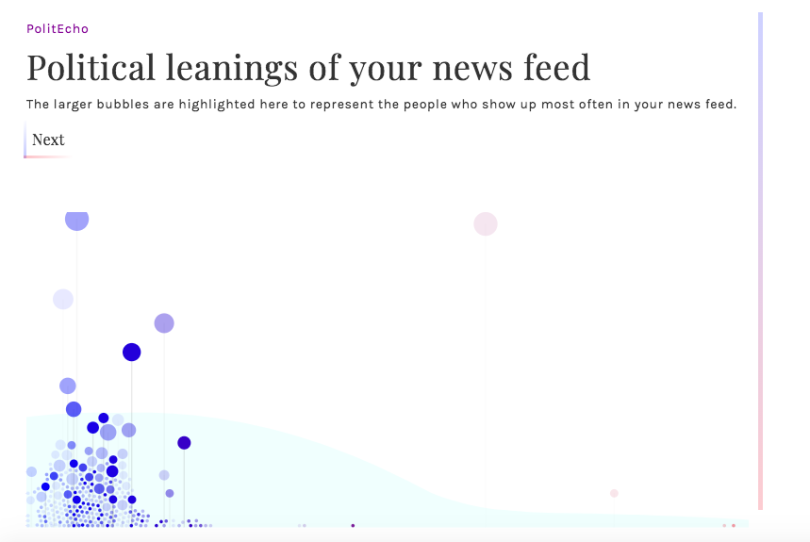This one wins the Best Dad Pun Title Prize of all of them so far. But what else does it contribute?
Background
PolitEcho is a Google Chrome extension created by Sunny He, Zachary Liu, Vivian Mo, and Jonathan Zong at Facebook Global Hackathon Finals 2016. The app “shows you the political biases of your Facebook friends and news feed” by assigning “each of your friends a score based on our prediction of their political leanings” and then visualizes these scores on a spectrum.”Then it calculates the political bias in the content of your news feed and compares it with the bias of your friends list to highlight possible differences between the two [x].”


Although it is easiest to download the extension in Chrome Media Store, the open source code can be also be accessed on GitHub here.
Overview:
Click on the “Get PolitEcho for Chrome” link on the center of the gradient lavender-pink bar seen in the previous screenshot to go to Chrome Media Store.
Accept these terms and conditions:
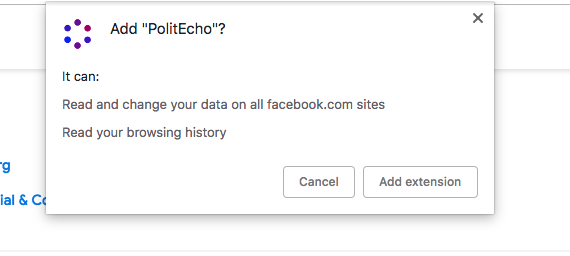
Note: you may want to review a list of Facebook.com sites before accepting.
After downloading, simply log into your Facebook account on Chrome. You will see the small PolitEcho logo circle on the right hand side of your Chrome tool bar, above the blue Facebook toolbar, next to your Google ID icon.
Simply click on the icon to start the app.
This is my result showing the “score map” of my FB friend list:
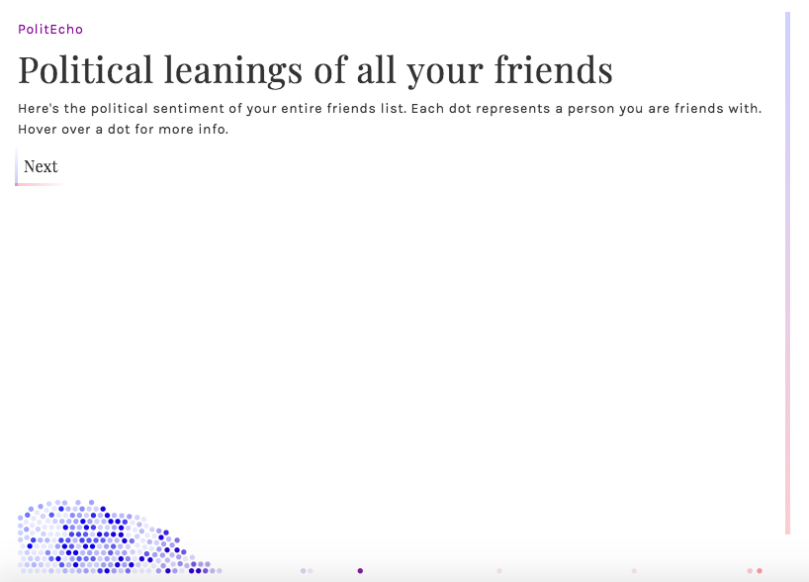
Hover your cursor over a dot to see a FB friend’s name and what Political pages they Like. Examples of some of my FB friends’ Liked pages:
You will notice each page has been coded on a spectrum from far right to left in accordance with the “score” given by PolitEcho and represented by different color. For example, as you can see below, WSJ is a warmer shade of purple than The Atlantic, signifying that PolitEcho codes WSJ as more conservative.

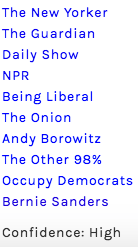
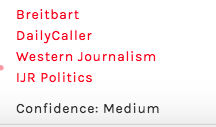




“Confidence” does not refer to how confident your friends are in their political views! “Confidence” refers to how accurately the algorithm may have coded your FBF based on liked pages and activity. You can see the algorithm is not confident in coding my WSJ friend purple. It is more confident coding the two columns in the middle. This has to do with input data — how much data it gets, what kind, etc. Higher “confidence” means a dark shade on the map. (See more here for information on confidence).
To compare my FBF spectrum to others, see other examples below:
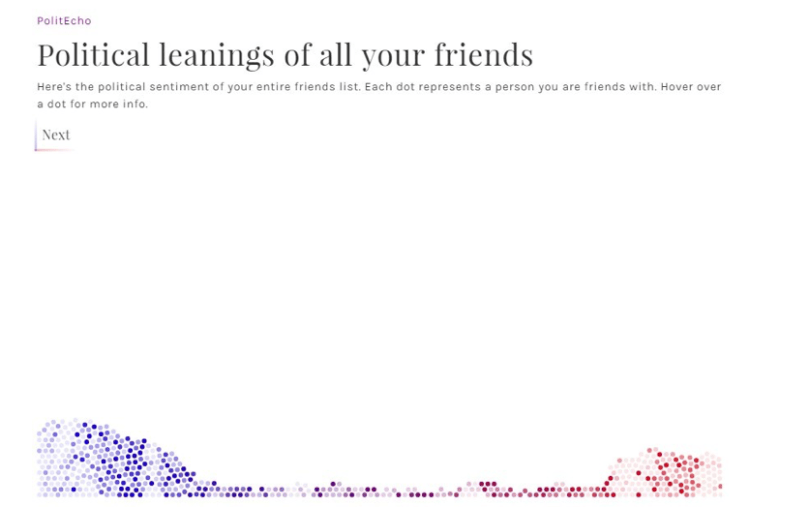
This person has far more conservative friends than I do, and far more conservative friends coded into a “light pink” by politico PolitEcho. Note that they seem to have few if any “blue” friends on the left side of the spectrum; more of a “blue-ish purple.”
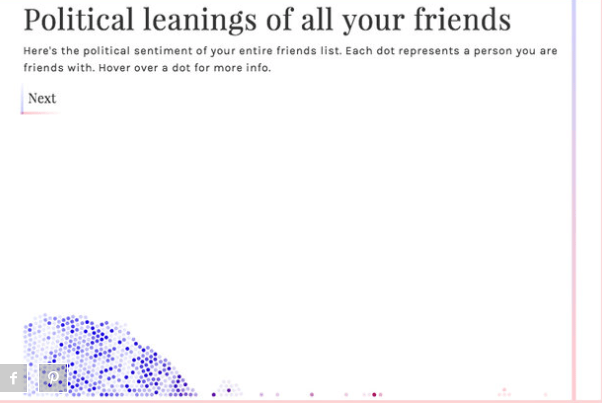
This demo example, on the other hand, shows a delineation not dissimilar to mine. The key difference is that their token right wings are not as far right as the ones on my FB feed. Both of these images seem to be from people who have more FB friends than I do — unsurprising, given my friending habits.
Other people have noted more unsettlingly discrepancies than mine:
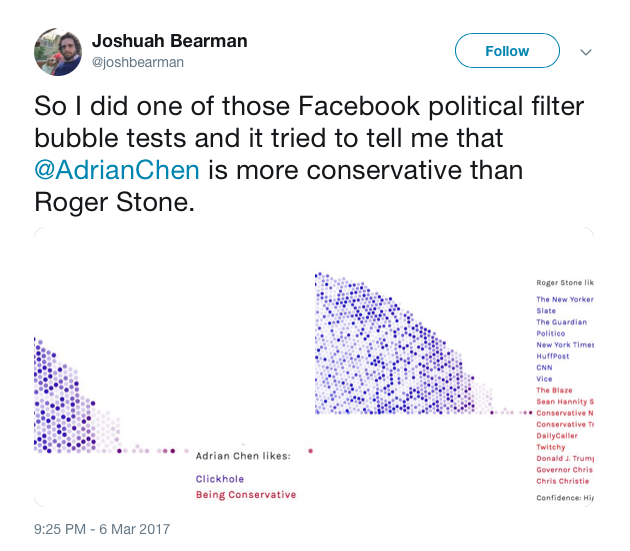
Note Chen replied to this tweet by commenting that he follows many “weird” pages for his work as a political journalist for The New Yorker.
After you have explored the political leanings of your FB friend group (and maybe discovered some nasty surprises about relatives and high school friends you haven’t seen in awhile), you can click “next” to move on to see the political leanings, of your news feed. As previously discussed on this blog, because your Facebook feed content is curated by personalization algorithms, your friend list is not representative of the content you see on your Facebook feed.
To calculate the political bias of your news feed, PolitEcho takes the score it has already assigned each FBF, then visualizes the prominence of each person on your feed.
These are my results for PolitEcho’s calculation of my news feed bias:
Close ups on the far left and center-right sides.
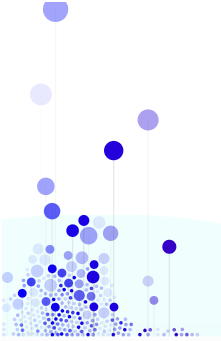

The larger and higher the person’s bubble, the more likely it is that they appear on your feed.
To compare and contrast my results with others, see below.
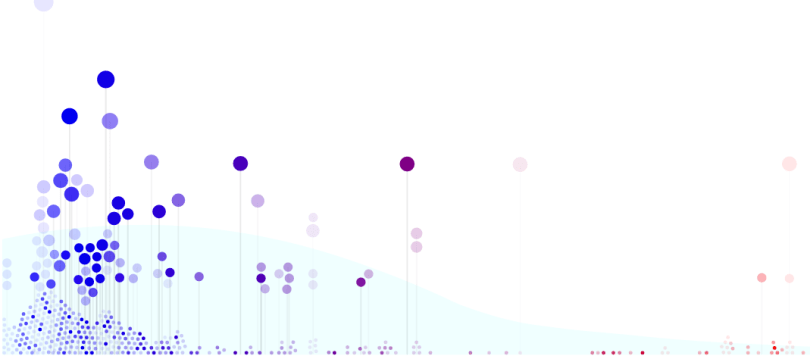
This image shows someone with more conservative friends — indeed, more friends — but with a feed skewered towards the mid-to left. This person also has a more diverse feed than mine in terms of how many friends appear on it (something that actually drives me nuts by the way I am trying to figure how to get other people back on my dash!).
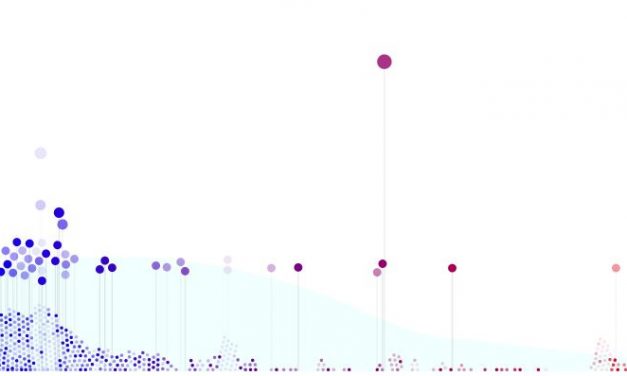
This image shows someone with a broad range of friends tilted towards purple. Although he has a number of “red” friends, the purples and blues tend to be the elevated voices on this feed, probably because they interact with “blue-leaning” posts more (liking the post, commenting on the post, etc.).
Notice that on my sample and on the image from The Detroit Times that the left side of our screens shows decidedly blue dots. This image above shows more purple dots on the left side of the screen. This shows us that our FB friends are ranked relative to each other with color. To put that another way, some of the examples I provided have many purple friends on the far left side of the map. Contrast: I have only blue friends on the far left of my map. This means that for some people, the most “left” of their friend feed is moderately liberal, while for other people, like me, my most “left” is hardcore left (but VERY ideologically diverse).
In the final step, PolitEcho visualizes both your FBF scores and your news feed scores in two circle charts calculating the spectrum of your friends’ affiliations on a wheel with no distinction between levels of “confidence.”
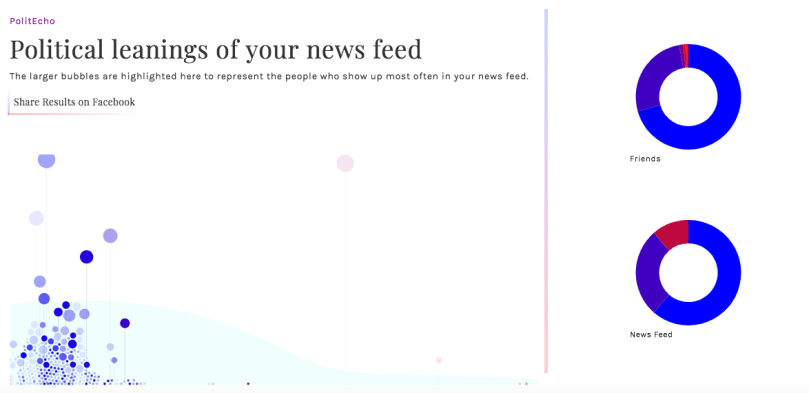

I will admit that I have no idea why there is a larger proportion of purple newsfeed of either shade than in my friend group. In other words, I do not have many conservative or “moderate” FB friends as calculated by the algorithm, but my news feed shows that some of their views are represented disproportionality to the smaller population. Huh. That’s kinda interesting and I’ll think about that.
Compare my results with others:
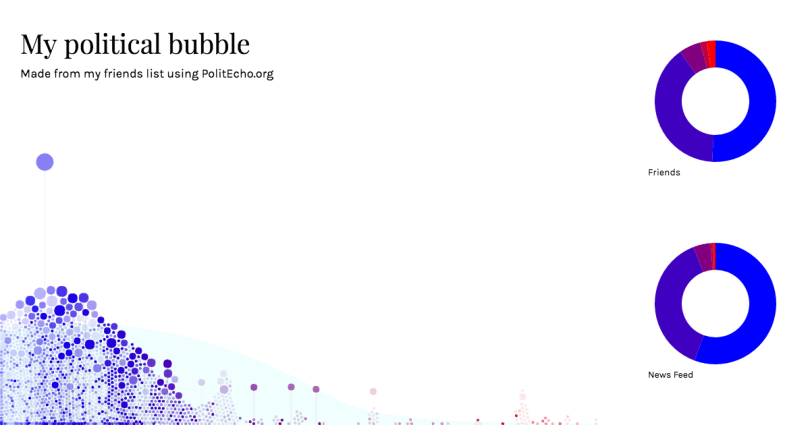
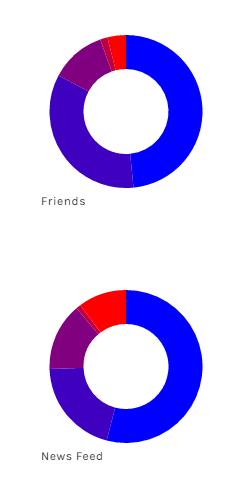
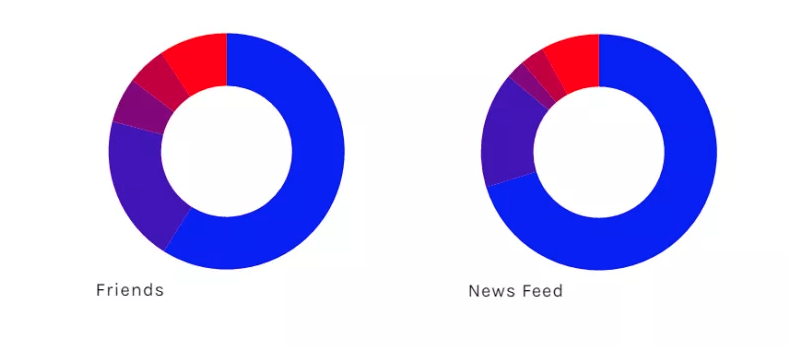
Review
It is a simple tool that does very little and does exactly what it is intended to do. No more, no less. While I have concerns regarding how the very light dots may be perceived by people with certain forms of color-blindness, the positionality on the spectrum helps mitigate potential issues with accessibility. There are, however, notable weaknesses in its scope and calculations.
It is inevitable that its calculations of color “coding” FBFs’ dots will not be entirely accurate. For one thing, different people use Facebook for different things. While many of us get our news from Facebook, there is a difference between liking “Polly Tischen for President” because you support Tischen’s campaign and liking the page specifically because you know that this means you will get content on your dash regarding her campaign, including live videos of her speaking in the Senate or eating tacos while campaigning in Texas.
It is also true that Facebook likes do not translate into support. My Facebook friend who only likes The Wall Street Journal is a socialist who describes himself far left of the left. I have no idea why The Wall Street Journal is the only paper he likes (this is an academic who reads a lot of news), but he also does not seem to like very many pages in general. The sole person in the middle of the spectrum is someone I suspect gets his news from Facebook and I suspect wants to know what is going on across partisan divides (he’s a bit of an eccentric fellow, and I mean that in a good way).
Or let’s go back to Chen replying to Bearman’s tweet by commenting that he follows many “weird” pages for his work as a political journalist for The New Yorker. This is a classic demonstration of how our activity in a platform within a media ecology influences the way the app represents you. In other words, the reason you use Facebook — be it to keep in touch with friends, to browse while procrastinating, to look at cat photos, to get news, follow “weird pages” — will factor in to how you are calculated in ways that may throw your FBFs off.
As I mentioned earlier, I appreciate the way that the color scale demonstrates your FBF’s calculated views on a scale in which your FBFs are evaluated by an algorithm that does not calculate them in comparison to each other. In other words, it shows you if your “far blue” is actually purple instead of coding them as blue because they are “more blue” than your other FBFs. That said, it is not a good tool for uncovering political nuance. In my FBF calculations, PolitEcho ranks my independents, socialists, libertarians, anarchists, communist, any non-Breitbart-Republicans who-have-stuck-around FBFs on the side of the blue by default. Like I said, I have a very ideologically diverse feed, as well as a class diverse, somewhat racially diverse (but still too white) and, to a lesser extent, nationality diverse feed. I saw a few of my European friends on the blue side but I am not sure if likes that are not in English are calculated.
It also does not — perhaps cannot — calculate by race. This is a good thing, since showing nationality, race, age, etc. of your FBF could lead to harassment and other negative consequences towards minorities. Actually, I do not want an app that can calculate social and political identity in more detail in a way your FBFs could see. Anyone following Cambridge Analytical knows that Facebook has enough data to construct psychological profiles. No doubt Facebook “knows,” but do we want a tool in which any of our FB friends could see deeper into our psycho-social profiles beyond what we liked on Facebook? Probably not.
Theory Talk:
That said, while I don’t think it is a bad thing that PolitEcho does not and cannot highlight individuals by race, it is worth pointing out that PolitEcho was created by Facebook in response to similar apps focused on visualization partisan divides the post-2016 election. These apps were created to serve some need of the American population. That need centered on partisan divides, not racial and class divides within a general political non-conservative affiliation. I am not saying the individual creators thought to themselves “hey let’s focus entirely on partisan divides to shift the conversation away from race.” I am saying that there was obviously a demand for products like PolitEcho that quickly displayed potential simple answers to complex questions like “why did I not see this coming?” “what is wrong with my worldview that limits me?” No one really could expect this app to answer those questions. But it is worth noting that the app was a product created in response to consumer demand for more representations of partisan divides in the context of “the information bubble.” Because that is what the public wanted. And that factors in to how we read PolitEcho as a cultural artifact.
Which public? In response to what anxiety?
Answer: often white people. Look, I am not going to get in-depth here about how Whiteness underlies most discussions about “breaking bubbles.” I do have to mention the white-centricism of essentially all conversations on information bubbles that focus on bridging partisan divides without addressing racial divides between non-conservatives. Without addressing which populations did often “see it coming,” specifically, people of color. Or addressing information bubbles within the left of center — for example, why white Bernie Sanders supporters were convinced he lost only because of “DNC intervention” and had no idea or refused to believe that Sanders could not win over the South. There was also a time where talking about class meant (and means) falling back on a caricature of “The White Working Class” that helps nobody. I literally have 3,500 words in a draft document of that last sentence, but I will leave it at that.
Anyway, I’ll just say people — specifically many white writers but not exclusively — were very focused on bridging partisan divides but without much nuance. Most of the articles I have found in my own dissertation research from around that time are centered on bridging partisan divides in a way that does not take into account minority epistemologies (theories of knowledge), or who did “see it coming,” and why. So it is important to explore PolitEcho as a rhetorical object in context of its design, intentions, and kairos in this historical context because its creation represents a worldview. I may be cynical about tools that focus on “filter bubbles” in terms of partisan divides alone, but in terms of rhetorical analysis, my opinion on partisan-centric frameworks is beside the point. PolitEcho’s design, the material circumstances that demanded its production, and the time in which it was developed and released, all contribute to its brief but bright popularity in late 2016 to early-mid 2017. It was a commodity designed to display “the current partisan-spectrum concept of the Filter Bubble” that someone could do within five minutes, and it easily fit into the dominate (white media) worldview of how filter bubbles worked. Its simplicity and its speed was the point.
In short, PolitEcho is a simple app with a simple project. That project is to provide simple “answers” to the complex questions asked in November 2016. It may have been developed at a 2016 Hackaton but it dropped shortly after Trump’s election for a reason. That is why PolitEcho is brilliant as a project. People wanted simple answers to a complex, overwhelming question. Algorithmically calculating humans into politically coded dots cannot provide an answer, but it presents a simple map of complex human Facebook networks. So, in terms of the creators’ and corporations’ “purpose,” PolitEcho successfully fulfills that purpose precisely because of the potential “weaknesses” I pointed out in the beginning of this Review.
Other Uses:
But for the average user, I doubt PolitEcho would be too misleading if understood with sufficient nuance. As we said earlier, to be more accurate, PolitEcho would have to be more invasive. Users are smart enough to understand the apps’ limitations. My argument is that PolitEcho represents a particular ideological framework of thinking of filter bubbles. It is an analysis of PolitEcho as a cultural artifact. It is also a value-neutral analysis in the context of PolitEcho’s existence, even though I am obviously critical of the larger cultural framework. I certainly do not think it “should not exist” or that it is morally “bad.” In my field, we historicize and rhetorically analyze the object, not moralize the object, unless it is something that must be fixed because it actively affects people’s lives, such as racist algorithms. Even then, the problem is rarely the practice or algorithm but the design…although there are some legit repulsive shit out there and I admit in Break On Through I did find something so frustrating I could not keep my academic cool.
The point is, I am not saying that you should not use PolitEcho. Actually I had a lot of fun messing around with it, after I wrote the bulk of this Overview.
So, with that said, how might PolitEcho affect one’s behavior? How else could we use it?
Well, one thing that makes PolitEcho different from many other extensions (like the one we will explore next time) is that PolitEcho makes the divide between interacting with information and interacting with people explicit. Diversifying your information intake is not the same as diversifying your friend group. While many people might think “gee, maybe I need to diversify our news intake,” we probably don’t think “gee, I better go and become FB with a lot of Trump voters” (assuming Trump voters would not self-select out of these friendships too — the filter bubble goes both ways). Ironically, another result of PolitiEcho is that showing the Liked pages of your friends, which may show you things about your friends hidden by your personalized Facebook feed, and therefore lead you to unfriend people. Lol.
So I do not think it inherently encourages people to make friends, but I am very glad that it shows people how their news feed is curated. Many people do not realize how content curation on your feed works. PolitEcho is a wonderfully accessible way to introduce anyone to the concept.
My favorite part was playing around on PolitEcho to snoop on my FBFs and see what they liked.
Why not?
Know someone who hides FB pages from you and turns out to be more right-wing than you suspected? Want to call out that uncle who voted for Trump behind your back and lied about it to placate you? As we just established, “Liked Pages” aren’t everything but they’re arguably a start.
Also keep this in mind:

Think critically about how much of your data you want to be exposed to Facebook websites. But, keep in mind, if one of your FBFs already used PolitEcho, some of your activity and calculated political “score” may be out there.
Oh, and check your own Liked pages while you’re at it, if you are particular about being coded a specific way. For example, you may think of yourself as a “purple” but your Facebook likes include Rachel Maddow, The Daily Show, and The New York Times but not The Wall Street Journal and The Atlantic. Maybe you do not care, but maybe you are someone who would be self-conscious if an FBF saw you on the “blue” side, and came away with a false conclusion about your political identity. Which, even if you are uninterested in politics, is still a part of your social identity. This raises the question of identity construction through online identity self-policing. I do not think this phenomenon would happen in response to PolitEcho because PolitEcho was never a “big deal.” But potential political mis-coding is worth pointing out if you are self-conscious about such things. And I admit, as a techno-cultural phenomenon, it is interesting and important to think about in the context of surveillance studies, but I shall leave it at that.
Honestly, I had fun on this app. As an academic, I cannot not recognize it as a representation of a particular ideological worldview. I suspect its ultimate value, beside entertaining users for a few minutes, may be as a cultural artifact that embodies a number of socio-historical qualities from that point in recent history. Not a “key” one, perhaps, but still worth noting.
In terms of usage, I can’t not recommend something that already exists. In fact, you might learn a great deal if you compare your results with your IRL friends and family as a bonding activity together. Just be conscious of what you want online, how you feel about sharing your FBFs information to multiple Facebook-owned sites, and how you yourself interact on FB if you are sensitive about being “miscoded” by an FBF who uses the app.
Have fun!
Works Cited
Bansheemann7. “My Political Bubble.” Full Speed Ahead, April 12, 2017. http://www.bansheemann7.com/10751/politecho-my-political-bubble.
Bearman, Joshua. “So I did one of those Facebook political filter bubble tests…” Tweet, March 6, 2017. https://twitter.com/joshbearman/status/838983932582457344
Blevins, Joe. “This browser extension shows how biased your social media feed is.” AV Club, Published: December 2, 2016. https://news.avclub.com/this-browser-extension-shows-how-biased-your-social-med-1798255038
Justice, Victoria. “PolitEcho visualizes your political bubble.” Pasquines, December 15, 2016. https://pasquines.us/2016/12/15/politecho-visualizes-your-political-bubble/
Zavala-Offman, Alysa. “Facebook is shaping the way you see the world, here’s how to stop it.” The Detroit Metro Times, December 1, 2016. https://www.metrotimes.com/the-scene/archives/2016/12/01/facebook-is-shaping-the-way-you-see-the-world-heres-how-to-stop-it
Preview for next time:
It started getting fun when the gun-fanatic conservative guy from San Antonio showed up. Or, the “bubble busting tool” meant to cultivate empathy for people with differing perspectives that ended up making me argue that maybe empathy isn’t always a virtue. Guest staring a cameo from Hallmark Cards, guaranteed member of the Illuminati.
